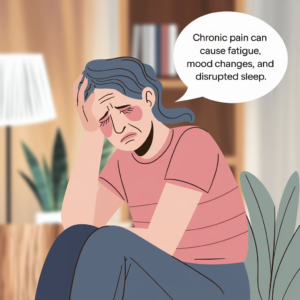Chronic neck pain that radiates into the head, shoulders, and jaw can significantly impact quality of life. For those who have tried the usual treatments without success, the journey to finding relief can be frustrating and disheartening. This article explores the complexities of chronic pain management and offers insights into alternative approaches when conventional treatments fall short.
Understanding Chronic Neck Pain
Chronic neck pain can stem from various conditions, including arthritis, which you mentioned was visible on your MRI. While arthritis is a common cause of neck pain, the fact that muscle relaxants and injections haven’t helped suggests that there might be more to your pain than meets the eye.
The Multi-Faceted Nature of Pain
Pain is not just a physical sensation; it’s a complex experience influenced by a myriad of factors, including emotional and psychological stress. When dealing with chronic pain, it’s crucial to adopt a multi-disciplinary approach that addresses not only the physical aspects but also the emotional and psychological components.

When the Usual Treatments Don’t Work
You’ve likely been through the gamut of traditional therapies, from medications to physical interventions, and yet the pain persists. Here’s what you can consider when the standard treatments don’t seem to help:
- Advanced Diagnostic Techniques: Sometimes, the root cause of pain isn’t apparent on initial tests. Advanced imaging techniques or specialized nerve studies might reveal issues that standard MRIs don’t catch.
- Integrative Medicine: Integrative medicine combines conventional medical treatments with alternative therapies. It’s an approach that looks at the whole person, not just the symptoms of pain.
- Biofeedback and Pain Psychology: Techniques like biofeedback can teach you to control certain body functions, such as muscle tension, which could contribute to your pain. Pain psychologists specialize in strategies to cope with the impact of chronic pain on your life.
- Nutritional Approaches: Emerging research suggests that inflammation can play a significant role in chronic pain. A dietitian or nutritionist might help you adjust your diet to reduce inflammation and potentially alleviate some pain.
- Innovative Medical Treatments: New treatments, such as regenerative medicine techniques like stem cell therapy or platelet-rich plasma (PRP) injections, are being explored for their potential to heal and reduce pain.
- Clinical Trials: Participating in clinical trials can give you access to cutting-edge treatments that are not yet widely available.
- Support Networks: Chronic pain can be isolating, but you’re not alone. Support groups, either in person or online, can connect you with others who understand what you’re going through.
A Journey of Exploration
Living with chronic neck pain is a journey—one that often requires exploring a variety of treatments and approaches. It’s important to maintain open communication with your healthcare providers and to advocate for yourself if you feel your pain isn’t being adequately addressed. Remember, new treatments and techniques are continually being developed, so there’s always hope for a better, pain-free future.
For those who resonate with this struggle, know that your journey is valid, and your pain is real. Keep searching, keep asking questions, and don’t settle for a life limited by pain.
Q: What can I do at home to manage chronic neck pain? A: At home, you can try various methods to manage pain, such as heat or cold therapy, gentle stretching exercises, or over-the-counter pain relievers as recommended by your doctor. Maintaining good posture, especially if you work at a desk, can also help reduce strain on your neck.
Q: Could my neck pain be related to my sleep habits? A: Yes, sleep posture can significantly impact neck pain. Consider the firmness of your pillow and mattress, and try to sleep in a position that maintains the natural curve of your spine. A physical therapist can offer personalized advice on the best sleep positions for neck pain.
Q: Are there any complementary therapies that might help with neck pain? A: Many people find relief through complementary therapies such as acupuncture, massage therapy, or chiropractic adjustments. It’s important to consult with a healthcare professional before trying these to ensure they’re appropriate for your specific condition.
Q: How can stress affect my neck pain? A: Stress can cause muscles to tense up, which can exacerbate neck pain. Techniques like mindfulness, deep breathing exercises, and yoga can help manage stress levels and may provide some pain relief.
Q: Is it normal for neck pain to cause headaches and jaw pain? A: Yes, it’s not uncommon for neck pain to radiate into the head and jaw, especially if the pain is related to muscle tension or nerve compression. This type of pain is often referred to as cervicogenic headache.
Q: Should I consider surgery for my chronic neck pain? A: Surgery is typically considered a last resort and usually only recommended if there’s a clear anatomical problem that can be corrected surgically. It’s essential to discuss the potential risks and benefits of surgery with a specialist.

Q: Can diet really make a difference in managing chronic pain? A: While diet isn’t a cure-all, certain foods can increase inflammation in the body, and others can reduce it. Some people report reduced pain after altering their diet to include more anti-inflammatory foods. Consulting with a nutritionist can provide you with a tailored dietary plan.
Q: What should I do if I feel like I’ve tried everything? A: If you’ve exhausted all conventional treatments, it might be time to consult with a pain clinic that offers a multi-disciplinary approach. These clinics often combine various specialists who can work together to create a comprehensive pain management plan.
Remember, managing chronic pain is often about finding the right combination of treatments that work for you. It’s a personal journey that can require patience and persistence. Keep working with your healthcare team, and don’t hesitate to seek out second opinions if you feel it’s necessary.
Q: Can physical therapy provide long-term relief from chronic neck pain? A: Physical therapy can be very effective for some people in managing chronic neck pain. A physical therapist can tailor exercises to strengthen the muscles around the neck and improve posture, which can help alleviate pain. They can also use techniques such as traction, manual therapy, and modalities like ultrasound or electrical stimulation to provide relief.
Q: Are there any lifestyle changes I can make to help manage my neck pain? A: Yes, lifestyle changes can play a significant role in managing neck pain. Regular exercise, weight management, quitting smoking, and reducing alcohol consumption can all have a positive impact on pain levels. Additionally, ergonomic adjustments to your workspace can help reduce strain on your neck.
Q: Is it safe to exercise with chronic neck pain? A: Exercise is generally safe and beneficial for chronic neck pain, but it should be done carefully and preferably under the guidance of a healthcare professional. Low-impact activities such as walking, swimming, or cycling can help maintain overall health without putting extra strain on the neck.
Q: How can I tell if my neck pain is muscle-related or something more serious? A: It can be challenging to determine the cause of neck pain without professional help. If your pain is accompanied by symptoms like numbness, tingling, weakness, or if it doesn’t improve with rest and over-the-counter treatments, it’s important to see a healthcare provider for a thorough evaluation.
Q: Can alternative medicine like herbal remedies help with neck pain? A: Some people find relief from herbal remedies and supplements, but it’s important to approach these with caution and under the guidance of a healthcare provider, as they can interact with other medications and may not be appropriate for everyone.
Q: When should I be concerned about my neck pain? A: You should seek immediate medical attention if your neck pain is the result of an injury, such as a car accident or fall, or if you experience severe pain that comes on suddenly. Other red flags include pain that is getting progressively worse, pain accompanied by fever, headaches, or unexplained weight loss, or if you have trouble with balance or coordination.
Q: Can meditation or mindfulness help with chronic neck pain? A: Mindfulness and meditation can be effective tools for managing chronic pain. These practices can help reduce stress, which may decrease muscle tension and pain. They can also help improve your coping skills and reduce the emotional impact of chronic pain.
Q: Is it possible that my neck pain is psychosomatic? A: While neck pain can have a physical cause, it’s also possible for emotional or psychological factors to contribute to or exacerbate physical pain. This doesn’t mean the pain isn’t real, but rather that it may have complex causes that need to be addressed holistically.
Q: Can a change in my diet really help with neck pain? A: There’s no one-size-fits-all answer, but some people find that certain foods can trigger inflammation and pain. Keeping a food diary and working with a nutritionist can help you identify any potential food sensitivities or triggers and develop a diet plan that may help alleviate your pain.
Q: What role does posture play in neck pain? A: Poor posture can contribute significantly to neck pain by straining muscles and ligaments. Making an effort to maintain good posture, especially while sitting for long periods, can help alleviate neck strain. Ergonomic chairs, standing desks, and posture-correcting devices are tools that can assist in maintaining proper alignment.
Q: Can massage therapy worsen neck pain? A: While massage therapy is often beneficial for neck pain, it’s important that it’s performed by a qualified therapist who understands your specific condition. In some cases, certain types of massage or too much pressure can exacerbate pain, so communication with your therapist is key.
Q: What are some simple daily exercises I can do to help my neck pain? A: Simple exercises like neck tilts, gentle stretches, and isometric exercises can help keep your neck muscles strong and flexible. However, it’s important to consult with a healthcare professional before starting any new exercise regimen to ensure that it’s safe for your specific condition.
Q: How can I manage neck pain during work? A: If you work at a desk, ensure your monitor is at eye level, your feet are flat on the floor, and your wrists are supported. Take frequent breaks to stretch and walk around. If you have a job that involves heavy lifting or repetitive motion, use proper techniques to protect your neck.
Q: Can neck pain be a sign of something more serious, like a heart attack? A: Neck pain is not typically a sign of a heart attack, but if it’s accompanied by chest pain, shortness of breath, or other heart attack symptoms, seek medical attention immediately.
Q: Should I use a neck brace to help with my neck pain? A: Neck braces can provide temporary relief by supporting the neck and reducing movement, but they should not be used long-term without a doctor’s recommendation, as they can lead to muscle weakness over time.
Q: Can children experience chronic neck pain? A: Yes, children can experience chronic neck pain, often due to poor posture, heavy backpacks, or injury. It’s important for children with persistent neck pain to be evaluated by a healthcare provider to determine the cause and appropriate treatment.
Q: How can I prevent neck pain in the future? A: Preventing neck pain involves maintaining good posture, staying active, using proper techniques during physical activities, and creating an ergonomic work environment. Regular check-ups with a healthcare provider can also help identify and address any potential issues before they lead to pain.
As an Amazon Associate we earn from qualifying purchases through some links in our articles.




